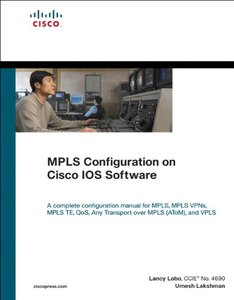Router Security Strategies: Securing IP Network Traffic Planes
暫譯: 路由器安全策略:保護 IP 網路流量平面
Gregg Schudel, David Smith
- 出版商: Cisco Press
- 出版日期: 2007-12-01
- 售價: $3,080
- 貴賓價: 9.5 折 $2,926
- 語言: 英文
- 頁數: 672
- 裝訂: Paperback
- ISBN: 1587053365
- ISBN-13: 9781587053368
-
相關分類:
資訊安全
海外代購書籍(需單獨結帳)
買這商品的人也買了...
-
 Microsoft PowerPoint 2003 使用手冊
Microsoft PowerPoint 2003 使用手冊$450$383 -
 Word 排版藝術
Word 排版藝術$620$490 -
 $1,078Operating System Principles, 7/e(IE) (美國版ISBN:0471694665-Operating System Concepts, 7/e) (平裝)
$1,078Operating System Principles, 7/e(IE) (美國版ISBN:0471694665-Operating System Concepts, 7/e) (平裝) -
 SQL 語法範例辭典
SQL 語法範例辭典$550$468 -
 Visual Basic 2005 Express 程式設計經典教本
Visual Basic 2005 Express 程式設計經典教本$580$435 -
 ActionScript 3.0 錦囊妙計 (ActionScript 3.0 Cookbook)
ActionScript 3.0 錦囊妙計 (ActionScript 3.0 Cookbook)$880$695 -
 C++ Primer, 4/e (中文版)
C++ Primer, 4/e (中文版)$990$891 -
 現代嵌入式系統開發專案實務-菜鳥成長日誌與專案經理的私房菜
現代嵌入式系統開發專案實務-菜鳥成長日誌與專案經理的私房菜$600$480 -
 Embedded Linux 開發實務徹底研究 (Embedded Linux Primer: A Practical Real-World Approach)
Embedded Linux 開發實務徹底研究 (Embedded Linux Primer: A Practical Real-World Approach)$720$612 -
 ASP.NET 問題解決實戰
ASP.NET 問題解決實戰$580$493 -
 Windows Mobile 6 應用程式設計與操控實務
Windows Mobile 6 應用程式設計與操控實務$580$452 -
 WiMAX 技術原理與應用 (Fundamentals of WiMAX)
WiMAX 技術原理與應用 (Fundamentals of WiMAX)$580$458 -
 最新 PHP + MySQL + AJAX 網頁程式設計
最新 PHP + MySQL + AJAX 網頁程式設計$650$553 -
 CCNA 認證教戰手冊 (CCNA: Cisco Certified Network Associate Study Guide (Exam 640-802), 6/e)
CCNA 認證教戰手冊 (CCNA: Cisco Certified Network Associate Study Guide (Exam 640-802), 6/e)$1,180$1,003 -
 Microsoft ASP.NET 3.5 最佳實務講座
Microsoft ASP.NET 3.5 最佳實務講座$680$578 -
 大話設計模式
大話設計模式$620$527 -
 威力導演 7-影音、剪輯、燒錄全能王
威力導演 7-影音、剪輯、燒錄全能王$360$284 -
 Google APIs 程式工具錦集
Google APIs 程式工具錦集$520$411 -
 ASP.NET 3.5 應用系統專題實作
ASP.NET 3.5 應用系統專題實作$590$460 -
 ASP.NET 專題實務-使用 C#
ASP.NET 專題實務-使用 C#$650$514 -
 Medical Decision Making (Paperback)
Medical Decision Making (Paperback)$1,920$1,824 -
 精通 JavaScript + jQuery
精通 JavaScript + jQuery$580$458 -
 打動人心的產品設計|頂尖設計師打造成功產品的黃金法則 (Designing Products People Love: How Great Designers Create Successful Products)
打動人心的產品設計|頂尖設計師打造成功產品的黃金法則 (Designing Products People Love: How Great Designers Create Successful Products)$580$458 -
 寫給 PM、RD 與設計師看的設計需求分析─使用者想要的應用程式都是這樣打造出來的 (Designing the Requirements: Building Applications that the User Wants and Needs)
寫給 PM、RD 與設計師看的設計需求分析─使用者想要的應用程式都是這樣打造出來的 (Designing the Requirements: Building Applications that the User Wants and Needs)$580$458 -
 The Linux Programming Interface 國際中文版 (上冊 + 下冊)
The Linux Programming Interface 國際中文版 (上冊 + 下冊)$1,600$1,264
商品描述
Router Security Strategies: Securing IP Network Traffic Planes provides a compre-hensive approach to understand and implement IP traffic plane separation and protection on IP routers. This book details the distinct traffic planes of IP networks and the advanced techniques necessary to operationally secure them. This includes the data, control, management, and services planes that provide the infrastructure for IP networking.
The first section provides a brief overview of the essential components of the Internet Protocol and IP networking. At the end of this section, you will understand the fundamental principles of defense in depth and breadth security as applied to IP traffic planes. Techniques to secure the IP data plane, IP control plane, IP management plane, and IP services plane are covered in detail in the second section.
The final section provides case studies from both the enterprise network and the service provider network perspectives. In this way, the individual IP traffic plane security techniques reviewed in the second section of the book are brought together to help you create an integrated, comprehensive defense in depth and breadth security architecture.
“Understanding and securing IP traffic planes are critical to the overall security posture of the IP infrastructure. The techniques detailed in this book provide protection and instrumentation enabling operators to understand and defend against attacks. As the vulnerability economy continues to mature, it is critical for both vendors and network providers to collaboratively deliver these protections to the IP infrastructure.”
–Russell Smoak, Director, Technical Services, Security Intelligence Engineering, Cisco
Gregg Schudel, CCIE® No. 9591, joined Cisco in 2000 as a consulting system engineer supporting the U.S. service provider organization. Gregg focuses on IP core network security architectures and technology for interexchange carriers and web services providers.
David J. Smith, CCIE No. 1986, joined Cisco in 1995 and is a consulting system engineer supporting the service provider organization. David focuses on IP core and edge architectures including IP routing, MPLS technologies, QoS, infrastructure security, and network telemetry.
- Understand the operation of IP networks and routers
- Learn about the many threat models facing IP networks, Layer 2 Ethernet switching environments, and IPsec and MPLS VPN services
- Learn how to segment and protect each IP traffic plane by applying defense in depth and breadth principles
- Use security techniques such as ACLs, rate limiting, IP Options filtering, uRPF, QoS, RTBH, QPPB, and many others to protect the data plane of IP and switched Ethernet networks
- Secure the IP control plane with rACL, CoPP, GTSM, MD5, BGP and ICMP techniques and Layer 2 switched Ethernet-specific techniques
- Protect the IP management plane with password management, SNMP, SSH, NTP, AAA, as well as other VPN management, out-of-band management, and remote access management techniques
- Secure the IP services plane using recoloring, IP fragmentation control, MPLS label control, and other traffic classification and process control techniques
This security book is part of the Cisco Press® Networking Technology Series. Security titles from Cisco Press help networking professionals secure critical data and resources, prevent and mitigate network attacks, and build end-to-end self-defending networks.
商品描述(中文翻譯)
《路由器安全策略:保護 IP 網路流量平面》提供了一個全面的方法來理解和實施 IP 流量平面的分離與保護,專注於 IP 路由器。本書詳細介紹了 IP 網路的不同流量平面以及為了運營安全所需的先進技術。這包括提供 IP 網路基礎設施的數據平面、控制平面、管理平面和服務平面。
第一部分簡要概述了網際網路協議和 IP 網路的基本組成部分。在本部分結束時,您將理解深度與廣度防禦的基本原則,這些原則適用於 IP 流量平面。第二部分詳細介紹了保護 IP 數據平面、IP 控制平面、IP 管理平面和 IP 服務平面的技術。
最後一部分提供了來自企業網路和服務提供者網路的案例研究。這樣,第二部分中回顧的各個 IP 流量平面安全技術被整合在一起,幫助您創建一個綜合的深度與廣度防禦安全架構。
「理解和保護 IP 流量平面對於 IP 基礎設施的整體安全姿態至關重要。本書中詳細介紹的技術提供了保護和工具,使操作員能夠理解和防禦攻擊。隨著脆弱性經濟的持續成熟,供應商和網路提供者必須協同提供這些保護措施給 IP 基礎設施。」
– Russell Smoak,思科技術服務部門主任,安全情報工程
Gregg Schudel,CCIE® No. 9591,於 2000 年加入思科,擔任顧問系統工程師,支持美國服務提供者組織。Gregg 專注於 IP 核心網路安全架構和技術,為互換運營商和網路服務提供者提供支持。
David J. Smith,CCIE No. 1986,於 1995 年加入思科,擔任顧問系統工程師,支持服務提供者組織。David 專注於 IP 核心和邊緣架構,包括 IP 路由、MPLS 技術、QoS、基礎設施安全和網路遙測。
- 了解 IP 網路和路由器的運作
- 瞭解面對 IP 網路、第二層以太網交換環境以及 IPsec 和 MPLS VPN 服務的多種威脅模型
- 學習如何通過應用深度與廣度防禦原則來分段和保護每個 IP 流量平面
- 使用安全技術,如 ACL、速率限制、IP 選項過濾、uRPF、QoS、RTBH、QPPB 等,來保護 IP 和交換以太網網路的數據平面
- 使用 rACL、CoPP、GTSM、MD5、BGP 和 ICMP 技術以及第二層交換以太網特定技術來保護 IP 控制平面
- 使用密碼管理、SNMP、SSH、NTP、AAA 以及其他 VPN 管理、帶外管理和遠端訪問管理技術來保護 IP 管理平面
- 使用重新著色、IP 分片控制、MPLS 標籤控制和其他流量分類及過程控制技術來保護 IP 服務平面
本安全書籍是思科出版社® 網路技術系列的一部分。思科出版社的安全書籍幫助網路專業人員保護關鍵數據和資源,防止和減輕網路攻擊,並建立端到端的自我防禦網路。










